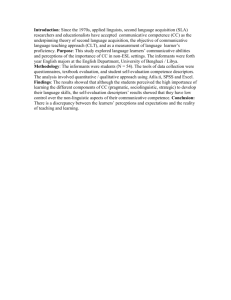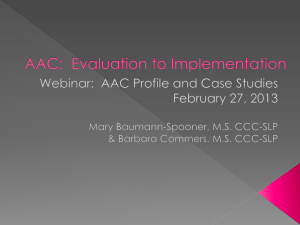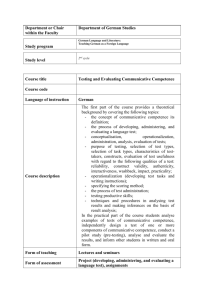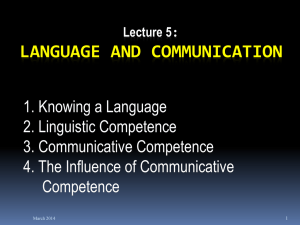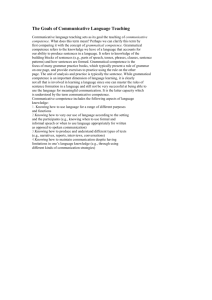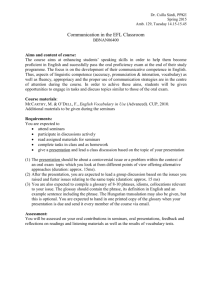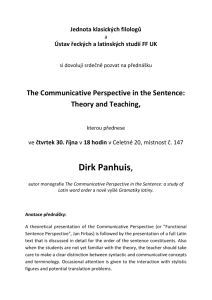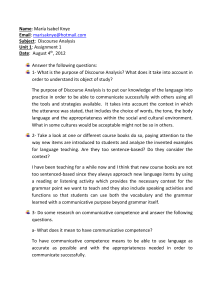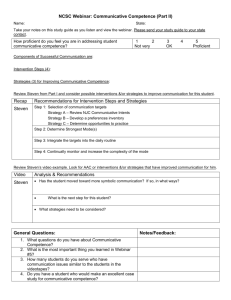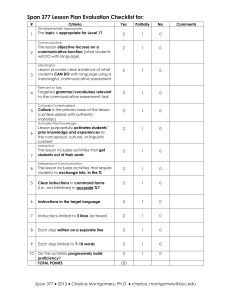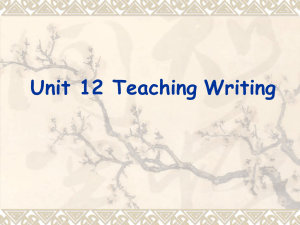Automatically generated PDF from existing images.
advertisement
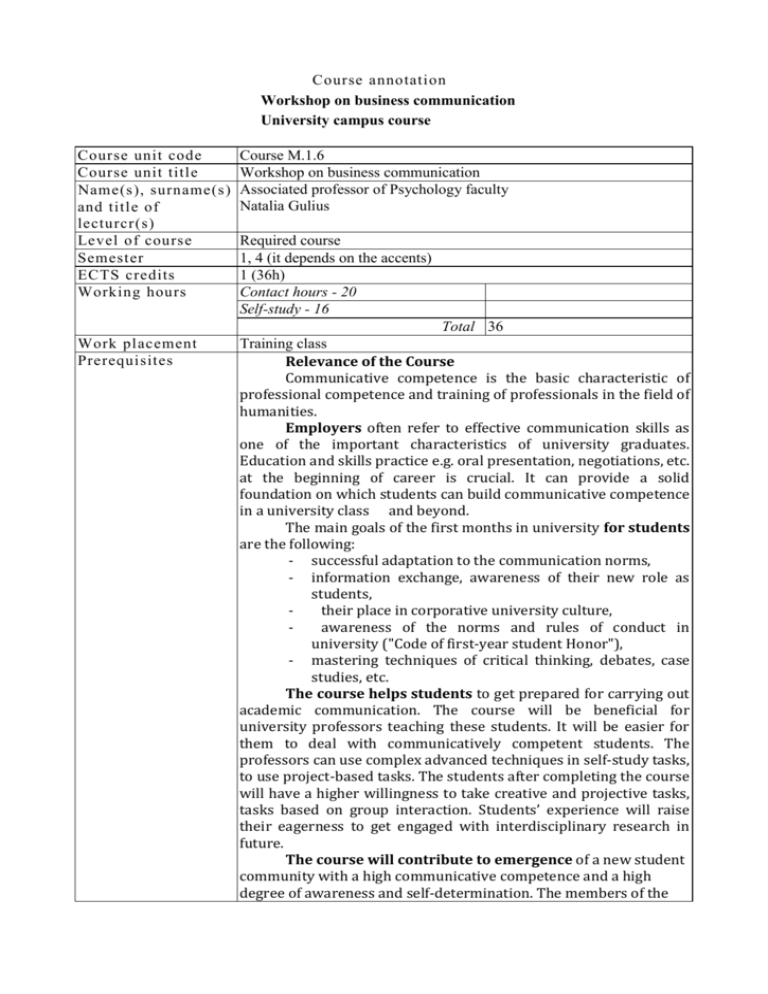
Course annotation Workshop on business communication University campus course Course unit code Course unit title Name(s), surname(s) and title of lecturcr(s) Level of course Semester ECTS credits Working hours Work placement Prerequisites Course M.1.6 Workshop on business communication Associated professor of Psychology faculty Natalia Gulius Required course 1, 4 (it depends on the accents) 1 (36h) Contact hours - 20 Self-study - 16 Total 36 Training class Relevance of the Course Communicative competence is the basic characteristic of professional competence and training of professionals in the field of humanities. Employers often refer to effective communication skills as one of the important characteristics of university graduates. Education and skills practice e.g. oral presentation, negotiations, etc. at the beginning of career is crucial. It can provide a solid foundation on which students can build communicative competence in a university class and beyond. The main goals of the first months in university for students are the following: - successful adaptation to the communication norms, - information exchange, awareness of their new role as students, their place in corporative university culture, awareness of the norms and rules of conduct in university ("Code of first-year student Honor"), - mastering techniques of critical thinking, debates, case studies, etc. The course helps students to get prepared for carrying out academic communication. The course will be beneficial for university professors teaching these students. It will be easier for them to deal with communicatively competent students. The professors can use complex advanced techniques in self-study tasks, to use project-based tasks. The students after completing the course will have a higher willingness to take creative and projective tasks, tasks based on group interaction. Students’ experience will raise their eagerness to get engaged with interdisciplinary research in future. The course will contribute to emergence of a new student community with a high communicative competence and a high degree of awareness and self-determination. The members of the community will successfully represent Tomsk University locally, nationally, and internationally. Modern student community is a breeding ground for emergence of future foresighters, volunteers, tutors, designers in the social spheres’ thinking. Language of instruction Objectives of the course We consider the following types of student groups: - homogeneous (Russian students only)/ international; - inter-departmental. English (90%), Russian (10%), it depends on group Learning outcomes A student's assessments methods The aim of course is to create the conditions for an effective business Active training participation communication. (30%) Work in small groups (30%) Students should: - Create the conditions for an effective The final course paper and business communication (BEFORE the presentation (40%) meeting - organizational and content preparation, DURING - contact, presentation of ideas, argumentation, and after the meeting - agreements and terms); - To prepare the presentation of themselves, of their research field Basic knowledge of students: - Basic principles of business communication; - Effective communication techniques techniques of active listening, I-messages, constructive resolution of contradictions and conflicts, feedback; - Theoretical and practical bases of business rhetoric and speech training; - The image of a business person (including CV, card). Learning basic skills: - Interactive (effective interaction in pairs, in a group, the art of a Small Talk); - Group skills (analytical and projective tasks in small groups, preparation of a joint presentation, analysis of their own group work); - Reflection (reflection group and individual activities). Teaching methods Mini -lectures Course unit content Seminars Tutorial - Course paper Course objective – 1. Goal of the course is to create conditions for formation of international student community in Tomsk state university. Course Objectives: 1. Forming university communication standards; 2. Mastering university techniques for information processing; 3. Raising intercultural communicative competence; 4. Coordinating interaction among students, team- and group-building. Mastering communicative competence within the course is implemented mostly in the genre of group training class and other interactive techniques (more detailed description below). Gained knowledge and skills- Students should: - Create the conditions for an effective business communication (BEFORE the meeting - organizational and content preparation, DURING - contact, presentation of ideas, argumentation, and after the meeting - agreements and terms); - To prepare the presentation of themselves, of their research field Basic knowledge of students: - Basic principles of business communication; - Effective communication techniques - techniques of active listening, I-messages, constructive resolution of contradictions and conflicts, feedback; - Theoretical and practical bases of business rhetoric and speech training; - The image of a business person (including CV, card). Learning basic skills: - Interactive (effective interaction in pairs, in a group, the art of a Small Talk); - Group skills (analytical and projective tasks in small groups, preparation of a joint presentation, analysis of their own group work); - Reflection (reflection group and individual activities). List of Topics Topic title 1. Conditions of an effective business Contact Assig nmen hours ts and indep endn t study hours 5 4 communication - a mini-lecture, general concepts, and the own experience reconstruction. 2. Stages of business communication: 5 preparatory (organizational, informative), the main, and the post-action. Mini-lecture, workshop. 3. Technique of effective communication - active 5 listening, feedback, self-statement. Mini-lecture, workshop. 4. Business rhetoric - Preparation of a text 5 message. Workshop. Toasts Masters. Mini-debate as a technique. 20 Assessment requirements Requirement Summary: 4 4 4 16 1. Essay \ report abstracts on a conference (Introduction, relevance of the topic for you, outlining the main part of the details and a detailed plan, methods, structure of an experience, the conclusion). 2. The volume of the report - 2-3 pages in the reference list at least three sources. 3. The style of the relationship - a small private research. 4. Power Point supporting. Assessment criteria The composition of Una] accumulative mark Passed \Fail Active training participation (30%) Work in small groups (30%) The final course paper and presentation (40%) Author of the course : ass.prof. Faculty of psychology, business-trainer Gulius Natalia
